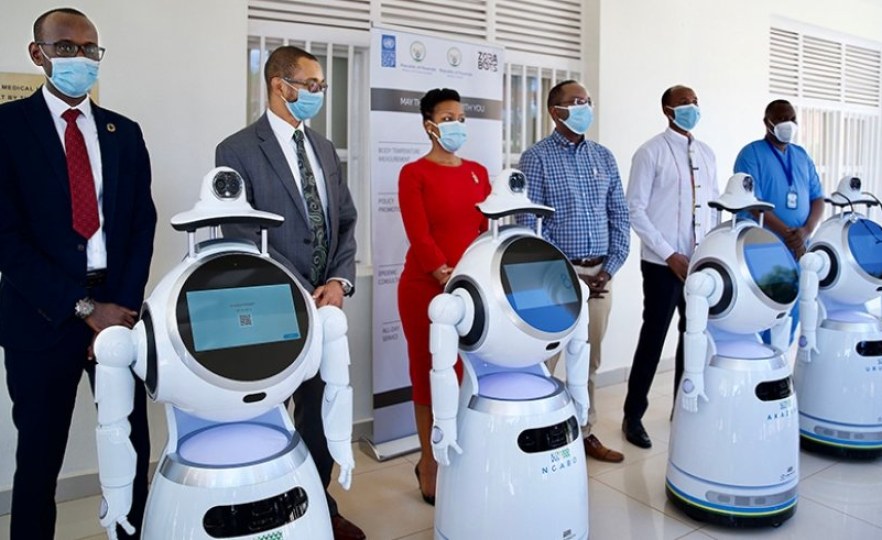-Regina Jane Jere
From Environment, sanitation and agribusiness to ICT, health and wellbeing, the class of Innovation Prize for Africa 2018 finalists is the most diverse, since the Africa Innovation Foundation rooted the popular initiative in 2011. Of the 10, three will emerge winners and share the US$185,000 prize-money at a date to yet be confirmed. But here are the top 10 African innovators, whose work that could play a crucial role in transforming Africa.
1. Biodegradable seed tray for rice farming (ICT) – By Juslain Nomenjanahary Raharinaivo – Madagascar
Juslain obtained his Engineering Degree from the College of Agronomic Sciences at the University of Antananarivo, Madagascar. In 1994, he developed a farm in northern Madagascar to culture mugwort and geranium. He then created a nursery system to culture both plants in 2008. Juslain is CEO of FFF Sarlu, the company that produces his innovation – the biodegradable seed tray for rice farming.
Rice is a staple food in many African countries, constituting a major part of the diet. With an ongoing demand for increased rice production, some African countries are unable to be self-sufficient. To increase rice production, transplanting of rice seedlings is important, but the cost of transplanting is high and farmers are hesitant to handle plants that are too young.
In Madagascar, Juslain’s innovation sows seed in innovative pots made of paper, called BG or biodegradable germinators. Growers transplant seedlings into easy-to-transplant clumps with a high tilling capacity which also increases rice yields and allow possibilities to expand the area under cultivation.
2. Buried Diffuser (Environment, Energy and Water) – By Wassim Chahbani – Tunisia
Wassim Chahbani is a social entrepreneur and co-owner of Chahtech, a water management company in Tunisia. Wassim holds a diploma in Electro-Mechanical Engineering from the Université Libre de Tunis (ULT) and has a strong background in Digital Marketing and Business Management.
Irrigated systems play a major role in sustaining livelihoods in Africa and the world over. Water in agricultural use is critical for crop production, but reducing its consumption is critical. Wassim’s innovation is a patented innovative irrigation system called “Buried Diffuser” that allows “more crop for less drop” through underground irrigation that delivers water and nutrients to plants at root level. Besides saving water, the diffuser produces healthier plants, resulting in better crop quality; it also eliminates herbicide use, reduces soil salinization, and improves soil aeration and energy savings.
The system comprises diffusing parts that facilitate water infiltration of the soil. A connection to a water distribution pipe helps regulate water flow to plants. This innovation performs markedly better than other current irrigation methods being used today in Africa, reducing production costs for farmers.
3. Efficient detection of TB and Hepatitis C (Health and wellbeing) – By Professor Abdeladim Moumen and Dr. Hassan Ait Benhassou – Morocco
Professor Abdeladim Moumen is head of Research and Development (R&D) at the Moroccan Foundation for Advanced Science, Innovation and Research (MAScIR) leading the development of innovative molecular diagnostic medical tests. He has a PhD in Biomedical Sciences from the Pasteur Institute of Paris, France, and was Research Associate at the Wellcome Trust-Gurdon Institute, Cambridge University (UK) as well as an Associate Professor at the University of London (UK).
Dr. Hassan Ait Benhassou heads the Tuberculosis Program at the Medical Biotechnology Centre of MAScIR. He received his PhD degree in Immunology from the Faculty of Pharmacy of Reims (France) and his MBA from the URCA University (France). He previously held a position of scientist at the Research and Development Institute (Montpellier/Rabat) and a position of Research Associate at the Faculty of Medicine of Reims.
Hepatitis C and Tuberculosis (TB) are critical health burdens in Africa. Besides lack of available treatment, access to accurate and cost-effective diagnostic tests remain a challenge across the continent. This innovation comprises two molecular tests for the rapid, accurate and effective detection and load quantification of both diseases. The sensitivity and specificity of both tests are higher than current molecular test in the market, thus reducing by half the time needed to perform the PCR reaction. These innovations are 3 to 5 times less expensive than current tests in the market.
4. E-Nose sensor for tea processing (Agriculture and Agribusiness) – By Abraham Natukunda – Uganda
Abraham Natukunda is Founder and Managing Director of Inter Connect Point Ltd, a technology start-up based in Rwanda. His background is in mobile money and systems administration, and more recently he graduated from Carnegie Mellon University Africa with an MSc in Information Technology.
Abraham has developed and implemented an Internet of Things (IoT) project to improve quality, control and revenue in the African tea value-chain, piloting at Rwanda Mountain Tea Factory. His innovation applies an “eNose” and analytics platform to supplement current tea processing procedures using low power sensor devices to determine optimum levels of tea fermentation.
An analytics platform receives and analyses the sensor data, providing real-time monitoring of key reactive elements and compounds during the tea processing period. This ensures efficient traceability, prediction, and motion. This innovation will lead to improved results in better tea quality and control, boosting marketability and increased revenue for tea processors from each bushel of tea harvested.
5. Incas Vaginal Discharge Kit (Health and Wellbeing) – By Dr. Laud Anthony Basing – Ghana
Laud Anthony Basing is a scientist, an innovator and an entrepreneur from Ghana with a background in Microbiology and Biomedical Engineering. He is Founder and CEO of Incas Diagnostics, the developers of low cost, easy to use point-of-care diagnostics for the African market. Dr Anthony is a 2016 Mandela Washington Fellow and former Chairman of the Linkages Committee of the West and Central African Regional Advisory Board of the fellowship.
His innovation, Incas Vaginal Kit (Incas Vagkit) is a 3-in-1 urine-based test kit that drastically reduces testing time for vaginal infections, leading to the efficient and quick detection and management of vaginitis.
The Vagkit simply requires a urine sample and can be used at home; results are available within 10 minutes. A mobile app allows women to speak anonymously to a doctor who then provides a prescription based on the test results. Current diagnostics require women to go to a hospital or lab, where a vaginal fluid sample is taken (mostly by a male) and results released after 72 hours.
6. “IThrone” portable toilet (Environment, Energy and Water) – By Dr. Diana Yousef – – Egypt
Dr. Diana Yousef (PhD, MBA) is a serial entrepreneur with strong expertise in commercializing technology in the clean- and bio-tech sectors. Her professional portfolio extends from McKinsey, to IFC/World Bank’s Life Sciences Investment Group and UNDP’s Inclusive Markets incubator, as well as WeCyclers, Immerse Global and SachSiSolar.
Her innovation responds to poor sanitation and health conditions, as well as pollution caused by sewage. It is a disruptive yet low-cost composite polymer membrane that essentially “shrink-wraps crap” aggressively evaporating or “flushing” away the full water content of daily sewage output without need for added heat, energy or flush water.
This revolutionary portable toilet, the “iThrone” eliminates ~95% of daily onsite sewage volumes, with no discharge to the environment, replacing the need for tanks, power, plumbing or peripheral components. The toilet is compact, drop-in deployable, stand-alone and self-operating—ideal for homes without sewers in crowded urban settings. It cuts off a significant amount of methane emissions generated by unmanaged/uncollected sewage.
7. Mobile Shiriki Network (ICT) – By Henri Nyakarundi – Rwanda
Henri Nyakarundi studied computer science in the USA. After developing the African Renewable Energy Distributor (ARED) Group, he returned to Rwanda in 2013 to start up his company full time. ARED brings last mile connectivity in rural and semi-urban areas using a micro-finance business model to achieve broad scale distribution.
The Mobile Shiriki Hub is a Smart Solar Kiosk, powered by strong solar panels and equipped with large capacity batteries, Internet of Things (IoT) sensors, and a custom designed router, offering device charging, virtual top-ups, and low-cost connectivity options for access to digital content and services.
The Shiriki Hub is designed as business-in-a-box with mobile kiosks – the ideal solution for digital connectivity services to rural populations. The service supports disadvantaged populations and temporal settlements such as refugee camps, offering partial subsidies to physically challenged groups and women.
8. Natural solutions for skeletal regeneration and repair (Health and wellbeing) – ByProf Keolebogile Shirley Motaung – South Africa
Professor Keolebogile Shirley Motaung is a Medical Research Scientist, Assistant Dean: Postgraduate studies, research and innovation in the Faculty of Science at Tshwane University of Technology (TUT) in South Africa, and Founder of Global Health Biotech (Pty) Ltd. In 2006, Prof Motaung was the first female at TUT to receive a Fulbright Scholarship to pursue her doctorate at University of California Davis (UCD) in the USA. She obtained her D.Tech (Biomedical Technology) in 2010 at TUT in collaboration with UCD.
Prof. Motaung has developed affordable alternatives to highly expensive recombinant and synthetic stimulants currently used in bone repair and musculo-skeletal injuries. Her two innovative products are natural, made from medicinal plants for skeletal regeneration and repair. La-Africa Soother (LAS) is a topical paste ointment for sportspeople as a natural anti-inflammatory cream to treat pain, infection, swelling and inflammation. It stimulates chondrocytes towards the regeneration of damaged cartilage in joints.
The second product which is Plant-Based Morphogenetic Factor Implant (PBMF) induces bone and cartilage formation. Treatment of fractures has been a continuous challenge for orthopaedic surgeons. This product differs from knee replacement, autografts and allografts, offering quick results with no waiting period and no harvesting of tissue, providing relief and safety for patients.
9. Reducing pollution in an eco-friendly way using GKSORB! (Environment, Energy and Water) – By Dr Fohla Mouftaou – Benin
Dr. Fohla Mouftaou is a paediatrician from Benin and Founder of Green Keeper Africa (GKA). He has a passion for entrepreneurship and environmental sustainability.
Water hyacinth is an environmental threat in many African countries, affecting lakes, rivers, agricultural fields, the fishing industry and livelihoods. Dr Fohla decided to transform this environmental threat into a scalable solution. His innovation, GKSORB is a 100% organic and biodegradable fibre made from water hyacinth. This innovation has the potential to absorb up to 17 times its weight, andit can be used as a separator for hydrocarbons, or as a cleaning agent for surfaces contaminated by pollutants such as hydrocarbons, acids and paints.
The manufacturing of GKSORB is built on a well-developed community employment scheme that involves nearly 700 people living around the lake surroundings often affected by water hyacinth.
10. Waxy II Technology (Environment, Energy and Water) – By Christian Mwijage – Tanzania.
Christian Mwijage is a social entrepreneur with a strong background in Project Design and Business Management. This, coupled with his passion for the environment, recycling and green living led to the establishment of Eco Act Tanzania. A for‐profit social enterprise, Eco Act addresses the challenges of urban waste management, plastic pollution, deforestation and climate change.
Every year, more than nine million tonnes of plastic garbage ends up in the ocean causing a major threat to marine life and people. Christian’s innovation recycles and transforms post-consumer waste plastic into durable and environmentally friendly plastic lumber using a chemical-free and energy conserving technology called “Waxy ӀӀ technology”.
Plastic timber is an affordable alternative to wood timber and can be used for building, construction and furniture production. This technology has the potential to counter environmental degradation, preserving forests, cutting down on deforestation and mitigating the effects of climate change.
Strengthen innovation ecosystems in Africa.
The final three winners will be announced at a date and place yet to be confirmed. The Innovation Prize for Africa initiative honours top African innovators whilst also building strategic partnerships with innovation enablers to strengthen innovation ecosystems in Africa.
To date, the Africa Innovation Foundation (AIF) has supported 55 IPA winners/nominees with more than US$1million and mobilized more than 9 400 innovators from all 55 African countries. This year, the prize attracted more 3000 applicants from 52 countries.
The AIF endorsement and exposure generated through IPA have seen past winners securing over US$135 million worth of investments to grow and scale their businesses. IPA past winners and nominee company valuations amount to over US$200 million.
“We are proud of the impressive innovations that made it to the top 10 this year. They are evident examples of African ingenuity and each innovation is solving a real challenge in a key sector. Africa, and indeed the rest of the world, must keep an eye out – these innovations are ready to propel our continent’s global competitiveness in the market! Furthermore, these top 10 nominees are a great reminder that if given access to capital, Africans are capable of solving African challenges whilst also contributing to the rest of the world,” Pauline Mujawamariya Koelbl the AIF Managing Director who has steered the IPA program since its establishment in 2011.
Each year, 10 final nominees are selected through a rigorous and validated process driven by an expert panel of judges. After face-to-face pitching sessions, the top three winners are selected. The winners and the nominees share the US$185,000 and other incentives, with the grand prize money of US$100,000 going to the best winning project, which in 2017 went to Egypt’s Dr. El-Shafei, for his patented innovation, SEMAJIB – a smart bearing that significantly improves turbine performance in single line combined cycle plants as well as conventional generator technology.
Related posts
Global | Didi Angaye Earns A Distinction Award, Another Feather To The Cap
On a bright sunny day, in the month of July, 2024, the prestigious Staffordshire University located in the West Midlands of England organised its Award giving and Graduation ceremony to honour graduates of various educational programmes and courses which it offers. Didi Timipah Angaye,…
Olu Of Warri Bags Award In UK, Wife Advocates Return To Cultural Values
The Olu of Warri, Ogiame Atuwatse III, has received the Leadership and Community Development award at the 14th African Achievers Awards (AAA), which took place at the Parliament House, United Kingdom. The award was presented by a member of the House of Lords, London, Rt…
Brit Awards | Asake, Burna Boy And Other ‘New Cats’ Get Nominations
Nigerian singers Burna Boy, Asake, and Rema have been nominated for the 2024 Brit Awards. The nomination list for the annual music awards show was released on Wednesday 25, January 2024. Burna Boy and Asake made the ‘Best International Artiste’ category, while ‘Calm…
Brit Awards 2024 | The Full List Of Artist(e)s
This year’s Brits nominees have been revealed ahead of the ceremony in London in March. Dua Lipa is the first star confirmed to perform at the event – but how many awards is she up for? Musicians including Raye, Central Cee, J Hus and Blur are also…
Top 10 Cryptocurrencies To Invest in January 2024
-Michael Adams From Bitcoin and Ethereum to Dogecoin and Tether, there are thousands of different cryptocurrencies, making it overwhelming when you’re first getting started in the world of crypto. To help you get your bearings, these are the top 10 cryptocurrencies based on their market…
The Risk And Reward Of ChatGPT In Cybersecurity
Juan is an experienced CTO with a demonstrated history of working in the computer and network security industry. He is an information technology professional skilled in SAP and Oracle applications, computer forensics, vulnerabilities research, IPS/IDS and information security. Unless you’ve been on a retreat in…
Explained – History Of Money From Fiat To Crypto
What is money? Money as a concept has been a cornerstone of human civilization and economic development. To start with the latter, money is a method of storing value and worth, and it also functions as a medium of exchange that allows individuals to exchange…
Studies Show That Nigerian Crypto Foreign Investment Is At A Record Low
Foreign direct investment in Nigeria fell by 33% last year due to a severe shortage of dollars, which discouraged crypto companies from expanding into the country. The largest economy in Africa has a foreign investment problem despite exponential growth in crypto adoption. The National Bureau…












